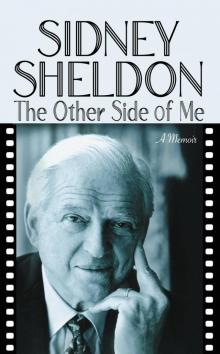- Home
- Sidney Sheldon
Sidney Sheldon's After the Darkness Page 2
Sidney Sheldon's After the Darkness Read online
Page 2
It hadn’t always been so.
Born Leonard Alvin Brookstein, the fifth child and second son of Jacob and Rachel Brookstein, Lenny had a horrific childhood. In later life, one of the few things that could rouse Lenny Brookstein’s rarely seen temper were books and movies that seemed to romanticize poverty. Misery Memoirs, that’s what they called them. Where did those guys get off? Lenny Brookstein grew up in poverty—crushing, soul-destroying poverty—and there was nothing romantic or noble about it. It wasn’t romantic when his father came home drunk and beat his mother unconscious in front of him and his siblings. Or when his beloved elder sister Rosa threw herself under a subway train after three boys from the Brooksteins’ filthy housing project gang-raped her on her way home from school one night. It wasn’t noble when Lenny and his brothers got attacked at school for eating “stinky” Jewish food. Or when Lenny’s mother died of cervical cancer at the age of thirty-four because she couldn’t take the time off work to see a doctor for her stomach cramps. Poverty did not bring Lenny Brookstein’s family closer together. It pulled them apart. Then, one by one, it pulled them to pieces. All except Lenny.
Lenny dropped out of high school at sixteen and left home the same year. He never looked back. He went to work for a pawnbroker in Queens, a job that provided him with more proof, if any were needed, that the poor did not “pull together” in times of trouble. They ripped one another’s throats out. It was tough watching old women handing over objects of huge sentimental value—a dead husband’s watch, a daughter’s cherished silver christening spoon—in return for a grudging handful of dirty bills. Mr. Grady, the pawnbroker, had had heart bypass surgery the year before Lenny went to work for him. Evidently the surgeon had removed his compassion at the same time.
Mr. Grady used to tell Lenny: “Value is not what something is worth, kid. That’s a fairy tale. Value is what someone is willing to pay. Or be paid.”
Lenny Brookstein had no respect for Mr. Grady, as a person or a businessman. But the truth of those words stuck with him. Later, much later, they became the foundation for Lenny Brookstein’s fortune and Quorum’s sensational success. Lenny Brookstein understood what ordinary, poor people were willing to accept. That one person’s concept of “value” was different from another’s, and that the market’s could be different again.
I owe the old bastard for that.
The story of Lenny Brookstein’s rise from pawnbroker’s lackey to world-respected billionaire had become an American legend, part of the country’s folklore. George Washington could not tell a lie. Lenny Brookstein could not make a bad investment. After a successful run of bets on the horses in his late teens (Jacob Brookstein, Lenny’s father, had been an inveterate gambler), Lenny decided to try his luck on the stock market. At Saratoga and Monticello, Lenny had learned the importance of developing a system and sticking to it. On Wall Street, they called a system a “model” but it was the same thing. Unlike his father, Lenny also had the discipline to cut his losses and walk away when he needed to. In the movie Wall Street, Michael Douglas’s Gordon Gekko had famously declared: “Greed is good.” Lenny Brookstein profoundly disagreed with that statement. Greed wasn’t good. On the contrary, it was the downfall of almost all unsuccessful investors. Discipline was good. Finding the right model and sticking to it, through hell or high water. That was the key.
Lenny Brookstein was already a millionaire many times over by the time he met John Merrivale. The two men could not have had less in common. Lenny was self-made, confident, a walking ball of energy and joie de vivre. He never spoke about his past because he never thought about it. His brilliant amber eyes were always fixed on the future, the next trade, the next opportunity. John Merrivale was upper class, shy, cerebral and prone to depression. A skinny, redheaded young man, he was nicknamed “Matchstick” at Harvard Business School, where he graduated top in his class, as his father and grandfather had both done before him. Everybody, including John Merrivale himself, expected he would go into one of the top-tier Wall Street firms, Goldman or Morgan, and begin his slow but predictable rise to the top. But then Lenny Brookstein burst into John Merrivale’s life like a meteor and everything changed.
“I’m starting a hedge fund,” Lenny told John the night they met, at a mutual acquaintance’s party. “I’ll make the investment decisions. But I need a partner, someone with a blue-chip background to help bring in outside capital. Someone like you.”
John Merrivale was flattered. No one had ever believed in him before. “Thank you. But I’m not a marketing guy. T-t-t-trust me. I’m a thinker, not a s-s-salesman.” He blushed. Goddamn stammer. Why the hell can’t I get over it already?
Lenny Brookstein thought: And a stammer, too. You couldn’t make this guy up. He’s perfect.
Lenny told John, “Listen. Salesmen are a dime a dozen. What I need is someone low-key and credible. Someone who can get an eighty-five-year-old Swiss banker to trust him with his mother’s life savings. I can’t do that. I’m too…” He cast around for the right word. “Flamboyant. I need someone that makes a risk-averse pension fund manager think: ‘You know what? This guy’s honest. And he knows his shit. I like him better than that sharp, cocky kid from Morgan Stanley.’ I’m telling you, John. It’s you.”
That conversation had been fifteen years ago. Since then, Quorum had grown to become the largest, most profitable hedge fund of all time, its tentacles reaching into every aspect of American life: real estate, mortgages, manufacturing, services, technology. One in six New Yorkers—one in six—was employed by a company whose balance sheet depended on Quorum’s performance. And Quorum’s performance was dependable. Even now, in the worst economic crisis since the 1930s, with giants like Lehman Brothers and Bear Stearns hitting the wall, and the government bailing out once untouchable firms like AIG to the tune of billions, Quorum continued turning a modest, consistent profit. The world was on fire, Wall Street was on its knees. But Lenny Brookstein stuck to his system, the same way he always had. And the good times kept rolling.
FOR YEARS LENNY BROOKSTEIN BELIEVED HE had everything he wanted. He had bought himself homes all over the globe, but rarely left America, dividing his time between his mansion in Palm Beach, his apartment on Fifth Avenue and his idyllic beachfront estate on Nantucket Island. He threw parties that everybody came to. He donated millions of dollars to his favorite causes and felt a warm glow inside. He bought a three-hundred-foot yacht, interior-designed by Terence Disdale, and a private Airbus A340 quad jet that he flew in only twice. Occasionally he slept with one of the models who made it their business to be around him, should he suddenly find himself in the mood for sex. But he never had “girlfriends.” He was surrounded by people, many of whom he liked, but he did not have “friends” in the traditional sense of that word. Lenny Brookstein was beloved by all who knew him. But he didn’t “do” intimacy. Everybody knew that.
Then he met Grace Knowles.
MORE THAN THIRTY YEARS LENNY BROOKSTEIN’S junior, Grace Knowles was the youngest of the famous Knowles sisters, New York socialite daughters of the late Cooper Knowles. Cooper Knowles had been a real estate guy, worth a couple hundred million in his heyday. Never as big as “the Donald,” Cooper was always far better liked. Even business rivals invariably described him as “charming,” “a gentleman,” “old-school.” Like her elder sisters, Constance and Honor, Grace adored her father. She was eleven years old when Cooper died, and his death left a void in her life that nothing could fill.
Grace’s mother remarried—three times in total—and moved permanently to East Hampton, where the girls’ lives continued much as they had before. School, shopping, parties, vacations, more shopping. Connie and Honor were both pretty and much sought after by New York’s eligible young bachelors. It was generally accepted, however, that Grace was the most beautiful of the Knowles sisters. When she took up gymnastics competitively at thirteen in an attempt to distract herself from her ongoing grief for her father, her elder sisters were secretly relieved. Gymnastic
s meant training, and traveling out of state, a lot. Once they were safely married off, it would be fine to have Grace come to parties with them again. But until then, Connie and Honor heartily encouraged their baby sister’s love affair with the parallel bars.
By the time she was eighteen, Grace’s days as a competition-level gymnast were over. But that was okay. By then Connie had married a movie-star-handsome investment banker named Michael Gray, a real up-and-comer at Lehman Brothers. And Honor had hit the marital jackpot by landing Jack Warner, the Republican congressman for New York’s 20th Congressional District. Jack was already being hotly touted as a candidate for the Senate, and perhaps even one day for the presidency. The Warners’ wedding was all over Page 6, and photographs of the honeymoon appeared in a number of national tabloids. As the new Caroline Kennedy, Honor could afford to be gracious to her little sister. It was Honor who invited Grace to the garden party where she first met Lenny Brookstein.
In later years, both Lenny and Grace would describe that first meeting as the proverbial thunderbolt. Grace was eighteen, a child, with no experience of the world outside her cosseted, pampered East Hampton existence. Even her friends from gymnastics were wealthy. And yet there was something wonderfully unspoiled about her. Lenny Brookstein had grown used to what his mother would have called “fast” women. Every girl he’d ever slept with wanted something from him. Jewels, money…something. Grace Knowles was the opposite. She had a quality that Lenny himself had never had and wanted badly. Something so precious and elusive, he had almost given up believing it existed: innocence. Lenny Brookstein wanted to capture Grace Knowles. To hold that innocence in his hands. To own it.
For Grace, the attraction was even simpler. She needed a father. Someone who would protect her and love her for herself, the way that Cooper Knowles had loved her when she was a little girl. The truth was, Grace Knowles wanted to go back to being a little girl. To go back to a time when she was totally, blissfully happy. Lenny Brookstein offered her that chance. Grace grabbed it with both hands.
They married on Nantucket six weeks later, in front of six hundred of Lenny Brookstein’s closest friends. John Merrivale was best man. His wife, Caroline, and Grace’s sisters were the matrons of honor. On their honeymoon in Mustique, Lenny turned to Grace nervously one night and asked: “What about children? We never discussed it. I suppose you’ll want to be a mother at some stage?”
Grace gazed pensively out across the ocean. Soft, gray moonlight danced upon the waves. At last, she said: “Not really. Of course, if you want children, I’ll gladly give them to you. But I’m so happy as we are. There’s nothing missing, Lenny. Do you know what I mean?”
Lenny Brookstein knew what she meant.
It was one of the happiest moments of his life.
“DO YOU KNOW WHAT YOU’RE WEARING yet?” Lenny pulled some papers out of his briefcase and put on his reading glasses before climbing into bed.
“I do,” said Grace. “But it’s a secret. I want to surprise you.”
Earlier that afternoon Grace had spent three happy hours in Valentino with her elder sister Honor. Honor had always had an amazing sense of style and the sisters loved to shop together. The manager had closed the store especially so that they could peruse the gowns in peace.
“I feel quite the rebel.” Grace giggled. “Leaving it to the last minute like this.”
“I know! We’re kicking over the traces, Gracie.”
The Quorum Ball was the society event of the season. Always held in early June, it marked the start of summer for Manhattan’s privileged elite, who decamped en masse to East Hampton the following week. Most of the women attending tomorrow night at The Plaza would have begun planning their outfits like generals before a military campaign months ago, ordering in silks from Paris and diamonds from Israel, starving themselves for weeks in order to look their flat-stomached best.
Of course, this year there would be some belt tightening. Everyone was talking about the economy and how dire it was. People in Detroit were rioting, apparently. In California, thousands of homeless had pitched tents along the banks of the American River. The headlines were dreadful. But for Grace Brookstein and her friends, nothing compared to the shock they’d felt the day they heard that Lehman Brothers had gone bankrupt. Lehman’s collapse was a tragedy far closer to home. Grace’s own brother-in-law Michael Gray had seen his net worth decimated overnight. Poor Connie. It really was too awful.
Lenny told Grace, “We have to strike a different tone this year, Gracie. The Quorum Ball must go ahead. People need the money that charities like ours provide now more than ever.”
“Of course they do, darling.”
“But it’s important we aren’t too ostentatious. Compassion. Compassion and restraint. Those must be our watchwords.”
With Honor’s help, Grace had picked out a very restrained black silk shift from Valentino, with almost no beading whatsoever. As for her Louboutin pumps? Simplicity itself. She couldn’t wait for Lenny to see her in them.
Slipping into bed beside him, Grace turned off her bedside lamp.
“Just a second, sweetie.” Lenny reached over and turned it on again. “I need you to sign something for me. Where is it now?” He fumbled through the sheets of paper littering his side of the bed. “Ah. Here we are.”
He handed Grace the document. She took Lenny’s pen and was about to sign it.
“Whoa there!” Lenny laughed. “Aren’t you going to read it first?”
“No. Why would I?”
“Because you don’t know what you’re signing, Gracie. That’s why. Didn’t your father ever tell you not to sign anything you haven’t read?”
Grace leaned over and kissed him. “Yes, my darling. But you’ve read it, haven’t you? I trust you with my life, Lenny, you know that.”
Lenny Brookstein smiled. Grace was right. He did know it. And he thanked God for it every day.
ON THE CORNER OF FIFTH AVENUE and Central Park South, a battalion of media had gathered in front of The Plaza’s iconic Beaux Arts façade. Lenny Brookstein was having a party—the party—and as always, the stars were out in force. Billionaires and princes, supermodels and politicians, actors, rock stars, philanthropists; everyone attending tonight’s Quorum Ball had one crucial thing in common, and it wasn’t a burning desire to help the needy. They were all winners.
Senator Jack Warner and his wife, Honor, were among the first to arrive.
“Go around the block,” Senator Warner barked at his driver. “Why the hell did you get us here so early?”
The driver thought, Ten minutes ago you were on my case for driving too slow. Make your goddamn mind up, asshole.
“Yes, Senator Warner. Sorry, Senator Warner.”
Honor Warner studied her husband’s angry features as they turned onto West Fifty-seventh Street. He’s been like this all day, ever since he got back from his meeting with Lenny. I hope he isn’t going to ruin this evening for us.
Honor Warner tried to be an understanding wife. She knew that politics was a stressful profession. It had been bad enough when Jack was a congressman, but since his elevation to the Senate (at the remarkably young age of thirty-six), it had gotten worse. The world knew Jack Warner as the Republican’s messiah—a conservative Jack Kennedy for the new millennium. Tall, blond and chiseled, with a strong jaw and a steady, blue-eyed gaze, Senator Warner was adored by voters, especially women. He stood for decency, for old-fashioned family values, for a strong, proud America that many people feared was crumbling daily beneath their feet. Just watching Senator Warner on the news, hand in hand with his beautiful wife, their two towheaded daughters skipping along beside them, was enough to restore people’s faith in the American Dream.
Honor Warner thought, If only they knew.
But how could they? Nobody knew.
Tentatively, she turned to her husband. “Do you like my dress, Jack?”
Senator Jack Warner looked at his wife and tried to remember the last time he had found her sex
ually attractive. It’s not that there’s anything wrong with her. She’s pretty enough, I guess. She’s not fat.
Honor Warner, in fact, was much more than pretty. With her wide-set green eyes, blond curls and high cheekbones, she was widely considered a striking beauty. Not as striking as her sister Grace, perhaps, but gorgeous nonetheless. Tonight Honor was poured into a skintight, strapless Valentino gown the same sea green as her eyes. It was a pull-all-the-stops-out dress. To any impartial observer, Honor Warner looked sexy as hell.
Jack said brusquely, “It’s fine. How much did it cost?”
Honor bit her lower lip hard. I mustn’t cry. My mascara’ll run.
“It’s on loan. Like the emeralds. Grace pulled some strings.”
Senator Jack Warner laughed bitterly. “How generous of her.”
“Please, Jack.”
Honor touched his leg in a conciliatory gesture, but he shrugged away her hand. Knocking on the glass partition, he said to the driver: “You can turn the car around now. Let’s get this evening over with.”
BY NINE P.M., THE PLAZA’S CREAM-AND-GOLD Grand Ballroom was packed to bursting. On either side of the room, beneath the splendidly restored arches, tables gleamed with brilliantly polished silverware. Light from the candelabras glinted off the women’s diamonds as the ladies mingled in the center of the room, admiring one another’s priceless couture dresses and swapping horror stories about their husbands’ latest financial woes.
“There’s no way we can afford Saint-Tropez this year. Ain’t happening.”
“Harry’s going to sell the yacht. Can you believe it? He loved that thing. He’d sell the children first if he thought anyone would buy them.”
“Did you hear about the Jonases? They just listed their town house. Lucy wants twenty-three million for it, but in this market? Carl thinks they’ll be lucky to get half that.”

 Windmills of the Gods
Windmills of the Gods After the Darkness
After the Darkness The Best Laid Plans
The Best Laid Plans Mistress of the Game
Mistress of the Game Tell Me Your Dreams
Tell Me Your Dreams Master of the Game
Master of the Game Memories of Midnight
Memories of Midnight Are You Afraid of the Dark?
Are You Afraid of the Dark? Nothing Lasts Forever
Nothing Lasts Forever Rage of Angels
Rage of Angels The Sky Is Falling
The Sky Is Falling The Sands of Time
The Sands of Time Morning, Noon and Night
Morning, Noon and Night The Doomsday Conspiracy
The Doomsday Conspiracy The Naked Face
The Naked Face The Other Side of Me
The Other Side of Me Bloodline
Bloodline The Stars Shine Down
The Stars Shine Down The Other Side of Midnight
The Other Side of Midnight A Stranger in the Mirror
A Stranger in the Mirror Sidney Sheldon's Angel of the Dark
Sidney Sheldon's Angel of the Dark Sidney Sheldon's the Tides of Memory
Sidney Sheldon's the Tides of Memory The Phoenix
The Phoenix Sidney Sheldon's Chasing Tomorrow (Tracy Whitney)
Sidney Sheldon's Chasing Tomorrow (Tracy Whitney) Sidney Sheldon's After the Darkness
Sidney Sheldon's After the Darkness Sidney Sheldon's Reckless
Sidney Sheldon's Reckless Master of the Game motg-1
Master of the Game motg-1 Sidney Sheldon's the Silent Widow
Sidney Sheldon's the Silent Widow Morning, Noon & Night
Morning, Noon & Night